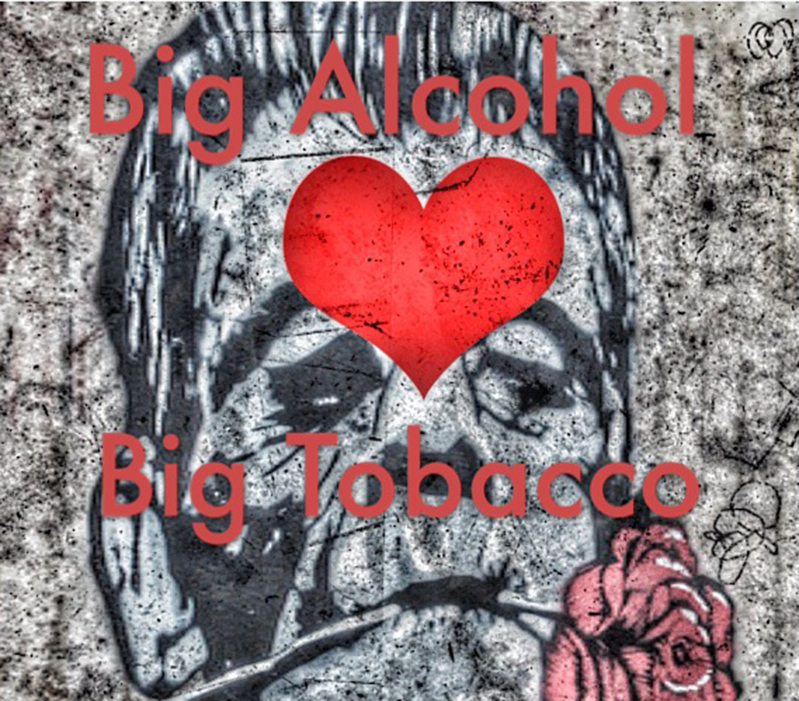Study: Big Alcohol Distorts Caner Risk
The alcohol industry is accused of misleading the public over alcohol’s cancer risk
The alcohol industry is misrepresenting evidence about the alcohol-related risk of cancer with activities that have parallels with those of the tobacco industry, according to new research published in the journal Drug and Alcohol Review. The study’s findings are important partly because the alcohol industry and their front groups are often involved in spreading health information to people around the world.
Scientists have presented evidence exposing the global alcohol industry of misleading the public over the link between consuming alcohol and cancer. Researchers from the London School of Hygiene and Tropical Medicine compare the actions with the tobacco industry’s attempts to dispute the link between smoking and lung cancer, VOA reports.
Tactics like Big Tobacco
The alcohol industry uses tactics out of the playbook of Big Tobacco:
- Denial,
- Distortion and
- Distraction.
The intent is to mislead the public about the risks of developing cancer from consuming alcohol, often employing similar tactics to those of the tobacco industry, a new study shows.
 Big Alcohol, including their lobby front groups, often present the relationship between alcohol and cancer as highly complex, implying there is no clear evidence of a consistent link, said the study led by scientists at the London School of Hygiene & Tropical Medicine (LSHTM) and Sweden’s Karolinska Institutet.
Big Alcohol, including their lobby front groups, often present the relationship between alcohol and cancer as highly complex, implying there is no clear evidence of a consistent link, said the study led by scientists at the London School of Hygiene & Tropical Medicine (LSHTM) and Sweden’s Karolinska Institutet.
Other strategies include denying any relationship exists, or saying inaccurately that there is no risk with moderate alcohol use, the study found. The industry also seeks to mention a wide range of other real and potential cancer risk factors in an effort to present alcohol as just one of many, it added.
According to the study, the researchers recommend decision-makers, government agencies, NGOs and public health bodies to reconsider their relationships to these alcohol industry bodies, as the Big Alcohol is involved in developing alcohol policy in many countries, and disseminates health information to the public.
The weight of scientific evidence is clear – drinking alcohol increases the risk of some of the most common forms of cancer, including several common cancers.
Public awareness of this risk is low, and it has been argued that greater public awareness, particularly of the risk of breast cancer, poses a significant threat to the alcohol industry.
Our analysis suggests that the major global alcohol producers may attempt to mitigate this by disseminating misleading information about cancer through their ‘responsible drinking’ bodies,” explains Mark Petticrew, a professor of public Health at the LSHTM who co-led the study.
Alcohol causes cancer but Big Alcohol is dubious about it
The World Health Organization says alcohol consumption is a well-established risk factor for a range of cancers, including tumors of the mouth, liver, breast and colon and bowel. And the risk of cancer rises with levels of alcohol consumed.
The research team behind the new study analyzed the information relating to cancer on the websites and documents of nearly 30 alcohol industry organizations around the world between September 2016 and December 2016.
The weight of scientific evidence is clear – drinking alcohol increases the risk of some of the most common forms of cancer,” said Prof. Petticrew.
It has been argued that greater public awareness, particularly of the risk of breast cancer, poses a significant threat to the alcohol industry. Our analysis suggests that the major global alcohol producers may attempt to mitigate this by disseminating misleading information.”
Most of the organizational websites (24/26) showed some sort of distortion or misrepresentation of the evidence about alcohol-related cancer risk, with breast and colorectal cancers being the most common focus of misrepresentation.
The most common approach involves presenting the relationship between alcohol and cancer as highly complex, with the implication or statement that there is no evidence of a consistent or independent link. Others include denying that any relationship exists or claiming inaccurately that there is no risk for light or ‘moderate’ drinking, as well discussing a wide range of real and potential risk factors, thus presenting alcohol as just one risk among many.
Petticrew’s team identified three main industry strategies:
- Denying any link with cancer, or selective omission of the relationship;
- Distortion by mentioning some risk of cancer, but misrepresenting or obfuscating its size; and
- Distraction by seeking to draw focus away from the risks of alcohol and towards other cancer risks.
One of the most significant findings was that industry materials omitted or misrepresented evidence on breast and bowel cancer, both of which are linked to alcohol intake. When breast cancer was mentioned, 21 of the organizations studied gave no, or misleading, information about it, the study said.
Cynical Big Alcohol tactics
The alcohol industry tactics are cynical, especially with regard to the low level of awareness of the link between alcohol use and cancer in many countries around the world. Scientists know since 1988 of alcohol’s carcinogenic effects in humans and yet only 1 in 10 Europeans know about the connection, and only 1 in 5 do believe that there is a connection between cancer and alcohol. In the United States, fewer than four in ten Americans now realize alcohol can cause cancer, even as the evidence with alcohol as a cause of cancer has grown. The low awareness of the alcohol-cancer link is especially concerning given that it has dipped over the past 16 years, from 42% in 2001 to 39% today.
—
For further reading: